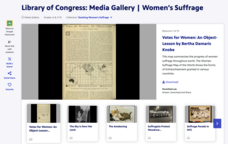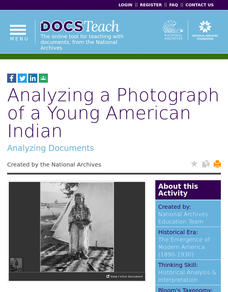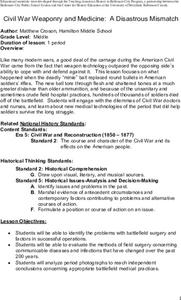EngageNY
What Gives Stories Their Power?
Read to me! Scholars get lost in a picture book read aloud of The People Could Fly. They discuss text-dependent questions and talk with partners about the meaning of the story. They then study an image in the book to determine the power...
Center for History Education
To What Extent Were Women's Contributions to World War II Industries Valued?
Women rose to the challenge when the nation's war effort called them—but were sent home when the GIs came back from World War II. Young historians consider whether the United States valued women's contributions during the war using a...
NASA
NASA Visualization Explorer
Read some of the most up-to-date information available from NASA's current Earth and space research! Along with showcased stories, you will find computer animations and satellite images that help you to view what humans cannot see with...
Echoes & Reflections
Contemporary Antisemitism
Despite the recognized atrocities of the Holocaust, anti-semitism continues. The 11th and final installment of the Teaching the Holocaust series explores the long-term effects of the Holocaust on modern anti-semitism, asking pupils to...
PBS
Primary Source Set: Little Women by Louisa May Alcott
What did Jo write her stories with? How did the March sisters dress? A primary source set designed for Louisa May Alcott's Little Women prompts learners to look over images of household items and clothes from the 1860s before...
US Department of Commerce
The Census Questionnaire: Then and Now
As the United States has changed, so has the census! While required by the Constitution, the questions the government asks to allot representation and federal funding has developed over time. Using images of previous censuses, young...
PBS
Library of Congress: Media Gallery | Women's Suffrage
Designed to support a study of women's suffrage in the United States, a primary source document set from the Library of Congress includes images, song sheets, articles, statistical documents, political cartoon, and audio recordings...
DocsTeach
The Civil War as Photographed by Mathew Brady
While there are no photographs of actual battles during the Civil War, the pictures of Matthew Brady still paint a vivid image of what life was like as a solider. Using a series of photographs, including those of camp life and the...
Museum of the American Revolution
Historical Analysis: Objects Tell Stories
Dig this! Young archeologists discover what objects teach us about the past. The activity uses an image of a Revolutionary War artifact to help historians practice analyzing the past. Scholars study the object and complete a worksheet to...
National Woman's History Museum
Breaking Barriers: Women’s Basketball Documents
Is basketball ladylike? A pressing debate in the nineteenth century explored the issue in the sports world. Using images, news reports, and the rules of the game, young scholars decide whether the sport helped advance the cause of women...
DocsTeach
Analyzing a Photograph of a Young American Indian
A true glimpse of the past, Angelic La Moose smiles back from more than 100 years ago. Young learners examine the picture of a young girl on a Montana Native American reservation from 1913 to comb it for historical details. A form, which...
DocsTeach
Comparing Urban and Rural Life in the Early 1900s
Experience a bit of what life was like at the turn of last century with images of rural and urban life. Learners consider pictures from each environment and then compare and contrast them. Activities include discussing the differences,...
Center for History Education
The Star-Spangled Banner: Fact or Fiction?
Is the Star-Spangled Banner an actual account of a gripping battle, or is it just a catchy tune? Young scholars compare eyewitness descriptions of the War of 1812 battle that inspired "The Star-Spangled Banner." They also examine images...
Center for History Education
Nineteenth Century Reform Movements: Women's Rights
It's hard to imagine a world where women were marginalized from the seats of power. Yet, there are women today who remember what it was like to not be allowed to vote. Using a DBQ of images and other primary sources, such as political...
DocsTeach
Sequencing from Seeds to Harvest
Explore the farm to table experience in a fast-paced lesson on gardening. The activity uses image sequencing to help young scholars understand the process of growing food from seed to harvest. Academics also participate in group...
Center for History Education
Civil War Weaponry and Medicine: A Disastrous Mismatch
Ironically, science was the reason why the Civil War was so deadly. Despite the use of medical practices now considered barbaric—such as conducting surgery with bare, dirty hands—developments in weaponry meant that more men died on and...
Center for History Education
Confronting Third World Nationalism: The United States and the Overthrow of Prime Minister Mossadegh
Not all rebellions are led by the people. An intriguing lesson explores the overthrowing of Iranian Prime Minister Mossadegh by the CIA. Scholars view a series of images and read background information to understand the circumstances...
DocsTeach
We Shall Overcome: March on Washington
Unlike most children, Edith Lee-Payne of Detroit went to the March on Washington with her mother to celebrate her 12th birthday. Pupils walk the march with her by analyzing a closeup image of her that has come to represent the pivotal...
DocsTeach
Analyzing an Allegorical Statue
Everyone sees art differently. An informative resource focuses on the image analysis of an allegorical statue. Scholars study the photo of the statue and complete a worksheet based on their findings. To finish, academics participate in...
National Park Service
Remembering Pearl Harbor: The USS Arizona Memorial
Young historians use primary source materials to investigate the 1941 attack on Pearl Harbor and the sinking of the USS Arizona. After reading background articles and studying maps and images of the attack, class members consider whether...
National Endowment for the Humanities
“Every Day We Get More Illegal” by Juan Felipe Herrera
A study of Jan Felipe Herrera's poem "Every Day We Get More Illegal" opens the door for a discussion on immigration. To begin, class members examine the photograph "Desert Survival," record their observations of the image, and then...
Curated OER
Drawing Mirror Images
In this mirror images activity, students solve 4 problems in which mirror image patterns are identified and mirror images of geometric figures are drawn. This page is intended to be an online activity, but can be completed on paper.
Curated OER
Math Problems, Calculations and Mirror Images
In this online math exercises worksheet, students complete a variety of assignments including practicing eight math calculations, two word problems and drawing three mirror images. Students check their work online as they go.
Curated OER
The Power of the Image: Understanding Symbols in Buddhist Art
Students discuss symbolism in art, examine various images of compassion in Buddhist tradition, analyzing components of the concept, and then produce their own images of compassion through art.
Other popular searches
- Imagery
- Body Image
- Mental Images
- Imagery Figurative Language
- Visual Imagery
- Music and Mental Images
- Microscopic Images
- Self Image
- Guided Imagery
- Analyzing Photographs
- Imagery and Poetic Devices
- Imagery Words























